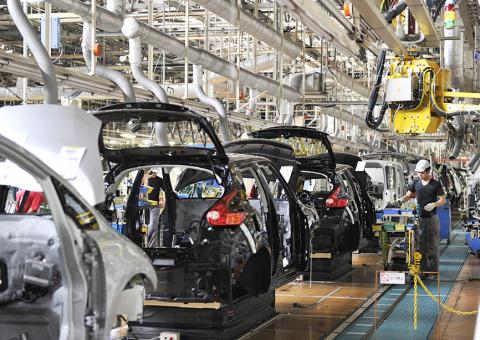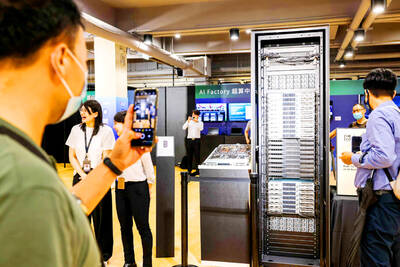Nissan Motor Corp yesterday announced plans for an US$800 million factory in China’s northeast as part of efforts to expand sales in the world’s biggest auto market.
The factory in Dalian will have a production capacity of 150,000 vehicles by 2014, rising to 300,000 later, the Japanese automaker said. It will be Nissan’s fourth manufacturing center in China.
Nissan announced an US$8 billion expansion plan for China last year as part of a global strategy to focus on faster-growing emerging markets and reduce reliance on the US.

Photo: AFP
“China is our largest market today and will continue to be one of Nissan’s most important engines of growth,” Nissan executive vice president Hiroto Saikawa said in a company statement.
The company also announced it signed a contract to deliver 1,000 electric vehicles produced under its Venucia brand, created with its Chinese joint venture partner, to the Dalian city government by this year. It said the joint venture would work with the city to promote electric vehicles.
Nissan’s plan in China with its partner, Dongfeng Group (東風集團), calls for opening new factories and introducing 30 new models by 2015. The company has said it also plans new factories and other initiatives in Russia, Brazil, India and Southeast Asia.
China’s total auto sales rose 16 percent last month over a year earlier to 1.6 million units, according to the China Association of Automobile Manufacturers. It said total sales for the first five months of the year were up 1.7 percent to 8 million units.

LIMITED IMPACT: Investor confidence was likely sustained by its relatively small exposure to the Chinese market, as only less advanced chips are made in Nanjing Taiwan Semiconductor Manufacturing Co (TSMC, 台積電) saw its stock price close steady yesterday in a sign that the loss of the validated end user (VEU) status for its Nanjing, China, fab should have a mild impact on the world’s biggest contract chipmaker financially and technologically. Media reports about the waiver loss sent TSMC down 1.29 percent during the early trading session yesterday, but the stock soon regained strength and ended at NT$1,160, unchanged from Tuesday. Investors’ confidence in TSMC was likely built on its relatively small exposure to the Chinese market, as Chinese customers contributed about 9 percent to TSMC’s revenue last

With this year’s Semicon Taiwan trade show set to kick off on Wednesday, market attention has turned to the mass production of advanced packaging technologies and capacity expansion in Taiwan and the US. With traditional scaling reaching physical limits, heterogeneous integration and packaging technologies have emerged as key solutions. Surging demand for artificial intelligence (AI), high-performance computing (HPC) and high-bandwidth memory (HBM) chips has put technologies such as chip-on-wafer-on-substrate (CoWoS), integrated fan-out (InFO), system on integrated chips (SoIC), 3D IC and fan-out panel-level packaging (FOPLP) at the center of semiconductor innovation, making them a major focus at this year’s trade show, according

DEBUT: The trade show is to feature 17 national pavilions, a new high for the event, including from Canada, Costa Rica, Lithuania, Sweden and Vietnam for the first time The Semicon Taiwan trade show, which opens on Wednesday, is expected to see a new high in the number of exhibitors and visitors from around the world, said its organizer, SEMI, which has described the annual event as the “Olympics of the semiconductor industry.” SEMI, which represents companies in the electronics manufacturing and design supply chain, and touts the annual exhibition as the most influential semiconductor trade show in the world, said more than 1,200 enterprises from 56 countries are to showcase their innovations across more than 4,100 booths, and that the event could attract 100,000 visitors. This year’s event features 17

Hon Hai Precision Industry Co (鴻海精密), which assembles servers for Nvidia Corp, yesterday said that revenue last month rose 10.61 percent year-on-year, driven by strong growth in cloud and networking products amid continued front-loading orders for artificial intelligence (AI) server racks. Consolidated revenue expanded to NT$606.51 billion (US$19.81 billion) last month from NT$548.31 billion a year earlier, marking the highest ever in August, the company said in a statement. On a monthly basis, revenue was down 1.2 percent from NT$613.86 billion. Hon Hai, which is also a major iPhone assembler, added that its electronic components division saw significant revenue growth last month, boosted